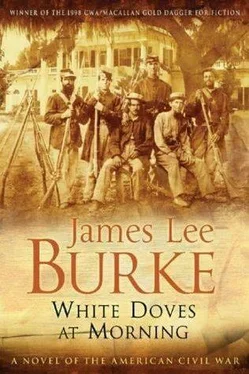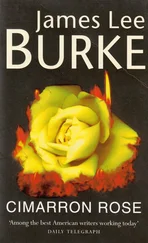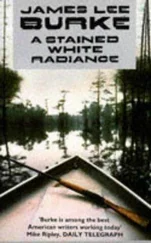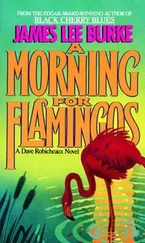
James Lee Burke
White Doves at Morning
I would like to thank Pamela Arceneaux at the WilliamsResearchCenter of New Orleans and C. J. LaBauve of New Iberia for their help with historical detail in the writing of this book.
for Dracos and Carrie Burke
1837
THE black woman's name was Sarie, and when she crashed out the door of the cabin at the end of the slave quarters into the fading winter light, her lower belly bursting with the child that had already broken her water, the aftermath of the ice storm and the sheer desolate sweep of leaf-bare timber and frozen cotton acreage and frost-limned cane stalks seemed to combine and strike her face like a braided whip.
She trudged into the grayness of the woods, the male shoes on her feet pocking the snow, her breath streaming out of the blanket she wore on her head like a monk's cowl. Ten minutes later, deep inside the gum and persimmon and oak trees, her clothes strung with air vines that were silver with frost, the frozen leaves cracking under her feet, she heard the barking of the dogs and the yelps of their handlers who had just released them.
She splashed into a slough, one that bled out of the woods into the dark swirl of the river where it made a bend through the plantation. The ice sawed at her ankles; the cold was like a hammer on her shins. But nonetheless she worked her way upstream, between cypress roots that made her think of a man's knuckles protruding from the shallows. Across the river the sun was a vaporous smudge above the bluffs, and she realized night would soon come upon her and that a level of coldness she had never thought possible would invade her bones and womb and teats and perhaps turn them to stone.
She clutched the bottom of her stomach with both hands, as though holding a watermelon under her dress, and slogged up the embankment and collapsed under a lean-to where, in the summer months, an overseer napped in the afternoon while his charges bladed down the cypress trees for the soft wood Marse Jamison used to make cabinets in the big house on a bluff overlooking the river.
Even if she had known the river was called the Mississippi, the name would have held no significance for her. But the water boundary called the Ohio was another matter. It was somewhere to the north, somehow associated in her mind with the Jordan, and a black person only needed to wade across it to be as free as the children of Israel.
Except no black person on the plantation could tell her exactly how far to the north this river was, and she had learned long ago never to ask a white person where the river called Ohio was located.
The light in the west died and through the breaks in the lean-to she saw the moon rising and the ground fog disappearing in the cold, exposing the hardness of the earth, the glazed and speckled symmetry of the tree trunks. Then a pain like an ax blade seemed to split her in half and she put a stick in her mouth to keep from crying out. As the time between the contractions shrank and she felt blood issue from her womb between her fingers, she was convinced the juju woman had been right, that this baby, her first, was a man-child, a warrior and a king.
She stared upward at the constellations bursting in the sky, and when she shut her eyes she saw her child inside the redness behind her eyelids, a powerful little brown boy with liquid eyes and a mouth that would seek both milk and power from his mother's breast.
She caught the baby in her palms and sawed the cord in half with a stone and tied it in a knot, then pressed the closed eyes and hungry mouth to her teat, just before passing out.
THE dawn broke hard and cold, a yellow light that burst inside the woods and exposed her hiding place and brought no warmth or release from the misery in her bones. There was a dirty stench in the air, like smoke from a drowned campfire. She heard the dogs again, and when she rose to her feet the pain inside her told her she would never outrun them.
Learn from critters, her mother had always said. They know God's way. Don't never ax Master or his family or the mens he hire to tell you the troot. Whatever they teach us is wrong, girl. Never forget that lesson, her mother had said.
The doe always leads the hunter away from the fawn, Sarie thought. That's what God taught the doe, her mother had said.
She wrapped the baby in the blanket that had been her only protection from the cold, then rose to her feet and covered the opening to the lean-to with a broken pine bough and walked slowly through the woods to the slough. She stepped into the water, felt it rush inside her shoes and over her ankles, then worked her way downstream toward the river. In the distance she heard axes knocking into wood and smelled smoke from a stump fire, and the fact that the work of the plantation went on rhythmically, not missing a beat, in spite of her child's birth and possible death reminded her once again of her own insignificance and the words Master had used to her yesterday afternoon.
"You should have taken care of yourself, Sarie," he had said, his pantaloons tucked inside his riding boots, his youthful face undisturbed and serene and without blemish except for the tiny lump of tobacco in his jaw. "I'll see to it the baby doesn't lack for raiment or provender, but I'll have to send you to the auction house. You're not an ordinary nigger, Sarie. You won't be anything but trouble. I'm sorry it worked out this way."
When she came out of the water and labored toward the edge of the woods, she glanced behind her and in the thin patina of snow frozen on the ground she saw her own blood spore and knew it was almost her time, the last day in a lifetime of days that had been marked by neither hope nor despair but only unanswered questions: Where was the green place they had all come from? What group of men had made them chattel to be treated as though they had no souls, whipped, worked from cain't-see to cain't-see, sometimes branded and hamstrung?
The barking of the dogs was louder now but she no longer cared about either the dogs or the men who rode behind them. Her spore ended at the slough; her story would end here, too. The child was another matter. She touched the juju bag tied around her neck and prayed she and the child would be together by nightfall, in the warm, green place where lions lay on the beaches by a great sea.
But now she was too tired to think about any of it. She stood on the edge of the trees, the sunlight breaking on her face, then sat down heavily in the grass, the tops of her shoes dark with her blood. Through a red haze she saw a man in a stovepipe hat and dirty white breeches ride over a hillock behind his dogs, two other mounted men behind him, their horses steaming in the sunshine.
The dogs surrounded her, circling, snuffing in the grass, their bodies bumping against one another, but they made no move against her person. The man in the stovepipe hat reined his horse and got down and looked with exasperation at his two companions. "Get these dogs out of here. If I hear that barking anymore, I'll need a new pair of ears," he said. Then he looked down at Sarie, almost respectfully. "You gave us quite a run."
She did not reply. His name was Rufus Atkins, a slight, hard-bodied man whose skin, even in winter, had the color and texture of a blacksmith's leather apron. His hair was a blackish-tan, long, combed straight back, and there were hollows in his cheeks that gave his face a certain fragility. But the cartilage around the jawbones was unnaturally dark, as though rubbed with blackened brick dust, knotted with a tension his manner hid from others.
Читать дальше













